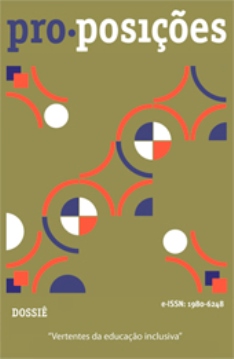Resumo
While the history of cultural studies cites origins in adult education and contemporary scholars continue to note the need for cultural studies work in schools the connections between cultural studies and educational theorizing seem strained. This paper suggests the recent film Waiting for Superman offers an opportunity for a cultural studies analysis with clear import on education and curriculum theorizing. In specific, this paper notes the important conjuncture of forces at work in the public discourse of so-called education reform in the contemporary US context and suggests that cultural studies analysis may be needed now more than ever. This offering provides linkages between the discursive construction of educative reform efforts, the material lived experiences of those who spend time in educative contexts, and the concomitant ethics that such constructions require. As free-market fundamentalism, neoconservative ideological formations, and representations of school and schooling are all in play, this perspective—both in the material and academic sense—intends to help reinvigorate the conversation between cultural studies and curriculum theorizing and provides new understandings of this “nightmare of the present”.Referências
Carroll, T. G. (2007). The high cost of teacher turnover. National Commission on Teaching and America’s Future.
Chilcott, L. (Producer), Guggenheim, D. (Director), & Guggenheim, D., & Kimball, B. (Writers). (2010). Waiting for Superman (Motion picture). United States: Paramount Pictures Entertainment.
Couric, K. (2010). @katiecouric: “Waiting for Superman”. @katiecouric. Retrieved December 9, 2010, from http://www.youtube.com/watch?v=L8jepdjqZIA
Dimitriadis, G., & Carlson, D. (2003). Promises to keep: cultural studies, democratic education, and public life. New York; London: RoutledgeFalmer
Fiske, J. (1989). Reading the popular. Boston: Unwin Hyman.
Gardner, D. P., Larsen, Y. W., Baker, W. O., Campbell, A., Crosby, E. A., Charles A. Foster, J., . . . Wallace, R. (1983). A nation at risk: The imperative for educational reform. The National Commission on Excellence in Education.
Grossberg, L. (2010). Cultural studies in the future tense. Durham: Duke University Press.
Grossberg, L. (1997). Bringing it all back home: Essays on cultural studies. Durham, NC: Duke University Press.
Grossberg, L., Nelson, C., & Treichler, P. A. (1992). Cultural studies. New York: Routledge.
Guggenheim, D. (2010a, November 1). Do you dither? [Blog post]. Retrieved December 13, 2010, from http://www.huffingtonpost.com/davis-guggenheim/do-youdither_b_776279.html
Guggenheim, D. (2010b, September 6). Repeat after me: We can't have great schools without great teachers [Blog post]. Retrieved December 13, 2010, from http://www.huffingtonpost.com/davis-guggenheim/repeat-after-me-we-canth_b_706090.html
Guggenheim, D. (2010c, October 3). The teacher who changed my life. [Blog post]. Retrieved December 13, 2010, from http://www.huffingtonpost.com/davis-guggenheim/aconversation-with-davis_b_748584.html
Guggenheim, D. (2010d, November 15). Teachers: Tell me what you think. [Blog post]. Retrieved December 13, 2010, from http://www.huffingtonpost.com/davisguggenheim/teachers-tell-me-what-you_b_783712.html
Hall, S. (1992). Cultural studies and its theoretical legacies. In L. Grossberg, C. Nelson, & P. A. Treichler (Eds.), Cultural studies. New York: Routledge.
Hall, S. (1996). Encoding/decoding. In S. Hall, D. Hobson, A. Lowe, & P. Willis (Eds.), Culture, media, language: Working papers in cultural studies, 1972-79. London: Routledge in association with the Centre for Contemporary Cultural Studies, University of Birmingham.
Harvey, D. (2005). A brief history of neoliberalism. Oxford; New York: Oxford University Press
HotPerogi. (2010). Re: Teachers: Tell me what you think [Blog comment]. Retrieved from (http://www.huffingtonpost.com/davis-guggenheim/teachers-tell-me-whatyou_b_783712.html).
Johnson, R. (1996). What is cultural studies anyway? In J. Storey (Ed.), What is cultural studies? A reader. London: Arnold.
nflanagan. (2010). Re: Teachers: Tell me what you think [Blog comment]. Retrieved from (http://www.huffingtonpost.com/davis-guggenheim/teachers-tell-me-whatyou_b_783712.html).
Pinar, W. (2004). What is curriculum theory? Mahwah, N.J.: L. Erlbaum Associates.
Ravitch, D. (2010). The death and life of the great American school system: how testing and choice are undermining education. New York: Basic Books.
Raymond, M., Brock, R., Cremata, E., Davis, D., Dickey, K., Cotter, M., . . . Surratt, K. (2009). Multiple choice: Charter school performance in 16 states. Stanford, CA: Center for Research on Education Outcomes.
Rudick, C. K. (2012). Blending cultural studies and critical communication Pedagogy to examine Waiting for Superman. Paper presented at the American Educational Studies Association Annual Conference, Seattle, Washington.
Taubman, P. M. (2009). Teaching by numbers: deconstructing the discourse of standards and accountability in education. New York: Routledge.
United States Department of Education. (2010). NCLB: An overview. Retrieved December 10, 2010, from http://www2.ed.gov/nclb/landing.jhtml?src=ln
Zoey14. (2010). Re: Teachers: Tell me what you think [Blog comment]. Retrieved from (http://www.huffingtonpost.com/davis-guggenheim/teachers-tell-me-whatyou_b_783712.html).
A Proposições utiliza a licença do Creative Commons (CC), preservando assim, a integridade dos artigos em ambiente de acesso aberto.


